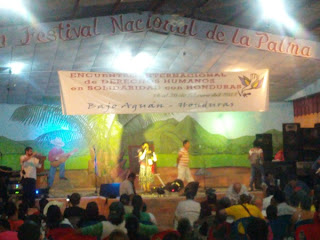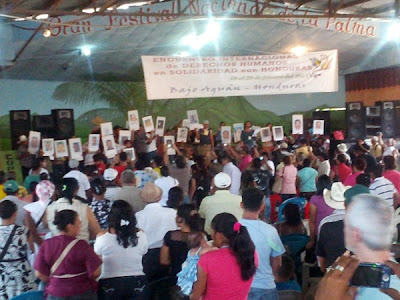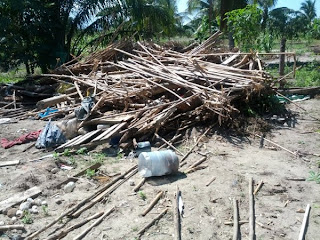Monday, February 27, 2012
New Threats In Aguan- Amnesty International
Thursday, February 23, 2012

|
The following agreements were approved at the conference plenary:
|
Monday, February 20, 2012
Report: Encuentro Internacional de Derechos Humanos en Solidaridad con Honduras

A La Voz de los de Abajo delegation of 8 people is in Honduras(February 14-22) to accompany the campesino movement and support the Internacional Encuentro por los Derecho Humanos en Aguan February 17-19. This Encuentro focused on the ongoing, increasingly grave Human Rights situation in Honduras, and particularly in the Aguan Valley where more than 60 campesinos, as well as journalists, have been assassinated by private guards of wealthy landowners, police, and the notorious Honduran military.
For two and a half days a diverse group of more than a thousand people concerned with the human rights situation in Honduras, came together in a large high school auditorium in the hot, dusty town of Tocoa, in the Aguan Valley, in Colon, Honduras. Every departmento (state) in Honduras was represented, but there was international interest in this conference and there were also participants from Nicaragua, El Salvador, Costa Rica, Guatemala, Mexico, Brazil, Cuba, the United States, and several European Countries. The delegates sat in plastic chairs on the floor of the auditorium and in the bleachers along the walls, attending to the speakers on the stage but also talking among themselves, sharing information, exchanging contacts, and building connections.
Mel Zalaya, the president of Honduras who was deposed in the June 2009 coup, “El Golpe de Estado”, was one of the first people to speak and presented one of the ongoing themes of the conference: impunity. He described being taken out of his house by a hundred armed and masked soldiers, put on an airplane to Costa Rica and left on the runway still in his pajamas.

No one, he said, has been brought to justice for this terrible crime against the rule of law in Honduras. A constitutional democracy was destroyed and no one has been held accountable. Speaker after speaker described assassinations, disappearances, torture, and intimidation that happen daily with impunity.ere were also participants from Nicaragua, El Salvador, Costa Rica, Guatemala, Mexico, Brazil, Cuba, the United States, and several European Countries. The delegates sat in plastic chairs on the floor of the auditorium and in the bleachers along the walls, attending to the speakers on the stage but also talking among themselves, sharing information, exchanging contacts, and building connections.
In addition to indispensable and heart-rending testimonials of repression in Honduras, particularly repression of the poor, the landless, and anyone who speaks out on their behalf or tries to help them organize, the conference offered a sophisticate and complex analysis of the underlying causes of difficulties faced by Hondurans. To an extent that may be surprising to visitors from wealthy countries of the north, campesinos in Honduras understand and are articulate about the economic, political, historical and cultural antecedents that contribute to their situation. The logistics of the conference were impressive. A thousand people were transported, fed, housed, and given opportunities to participate in large group decision making. It all came off without a hitch and with an overall atmosphere of camaraderie in a mutual struggle.
Finally, while deeply serious, the conference was energizing and fun. Performances included two of the original members of the Nuevo Trova movement from Cuba, dancers from Garifuna communities, traditional Baile Folklorica, rappers from one of the most successful land recuperation communities, spoken word drama, and popular Latin American music.
The Encuentro was a vivid reminder of the deadly problems Hondurans face everyday, but also a celebration of international solidarity in the face of repression, and a challenge to redouble efforts towards a time when there will be safety, justice, and democracy in this beautiful country.
More videos, pictures, and other information from the Encuentro is available: http://mioaguan.blogspot.com/
Friday, February 17, 2012
Delegation Report: Standard Fruit Uses the Army & Police to Attack Campesinos
 A La Voz de los de Abajo delegation of 8 people is in Honduras
A La Voz de los de Abajo delegation of 8 people is in Honduras(February 14-22) to accompany the campesino movement and to support
the Internacional Encuentro por los Derecho Humanos en Aguan February
17-19. We are traveling with compañeros and compañeras from the
National Center for Rural Workers (CNTC) and will be sharing ourexperiences and the stories of the campesinos.
Location: Salado Lislis community, Atlantida province
Standard Fruit Uses the Army and Police to Attack Campesino Families
It is beautiful; green fields of beans, peas, tomatoes, corn, papaya
trees, coconut palms and African palm with wooden and palm houses
scattered throughout the scene it could be an advertisement for themodel small farming community in Central America –but bulldozer tracks
run across many of the fields of vegetable and almost all the houses
are smashed flat, or reduced to piles of sticks with household items,
shoes, even toys scattered in the debris. We walk with the campesinos
and campesinas around the settlement, stopping at the piles of rubble
that were their houses and they tell us what happened.
On February 8th at 6 am more than 200 armed troops (in National Police
and the Army's 15th Battalion uniforms, with bulldozers from a
private company arrived at the community. Many of the troops were
wearing shirts that said “DOLE” under bullet proof vests with markings
of the National Police or military. The judge who accompanied thesecurity forces (juez ejecutor) to execute the eviction order was
wearing a Standard Fruit (more well known as Dole ) vest. It is not
unusual for a big land owner to pay for an eviction but thecampesinos told us it is unusual and probably illegal for judges and
“official troops” to wear uniforms of the big agribusiness landowners.
The community also was sure that the “Dole” shirted troops were really
private security from Standard Fruit Honduras who had been given
government security uniforms for the eviction, something which the
campesinos and their representative from the CNTC say is illegal.
The entire community was given only 30 minutes to gather their familymembers and belongings and leave their land and homes. The men, women
and children had to run and evacuate their lands finally heading
towards the border with the adjacent department of Colon where the
eviction order would not have power. It began to pour rain and the
community was gathered on the Colon side of the border with no water,
food, or shelter until they were able to move again to safer places.
the homes and to destroy fields, cut down plants and trees, and pulled
up yucca. But the campesinos are determined to continue on the land
the campesino movement moved back onto their land, knowing that their
claim to the land should be recognized under the agrarian laws. Their
situation is precarious. They are living in makeshift shelters and
some abandoned buildings. Their school for more than 60 children fromthe community is closed. Their teachers were from an NGO project and
the community doesn't know if they will come back. Yet the situationis even more precarious because they know that there is a high risk of
another eviction at any time.
The campesinos asked us to let the world know about their struggle and look for ways to help them pressure for a peaceful resolution of the land ownership for
One way we can help in the U.S. is to pressure Standard Fruit (Dole) Corporation to give up their illegal claim to the land and to immediately stop all threats of

 Background and History- Standard Fruit and Salado Lislis
Background and History- Standard Fruit and Salado LislisIn June 2010, 100 families recuperated land in Salado Lislis that is
eligible for agrarian reform expropriation. The land was claimed by
Standard Fruit Honduras (part of the Dole brand in the US). Standard
Fruit Company is a U.S. Corporation, which along with United Fruit
Company, notoriously dominated the Honduran economy and politics for
years. Standard Fruit (Dole) had a 100 year concession for land along
the coast in this area of Atlantida. When the concession expired, the
land was returned to the Honduran government which then immediately
sold the land to a questionable, newly-formed company called Standard
Fruit Honduras. The new “Honduran-owned” company was formed to side
step a Honduran law which prohibits foreigners from owning land within
a certain distance from the coast line. The Honduran name used to
register Standard Fruit Honduras is actually that of the Chief of
Security for Standard Fruit (Dole) operations in Honduras, thus being,
what Hondurans call a “presta-nombre”, someone who sells the use of
their name for property transaction that require a Honduran citizen.
Despite two years of legal processing and negotiations with the
National Agrarian Institute (INA), the obvious irregularities with
Standard Fruit's claim, and the eligibility of the land for
expropriation, the land title has not been resolved. Decree 18-2008
issued by former President Zelaya, ousted by the coup d'e'tat of 2009,
would have resolved the conflict in favor of the campesinos. The
decree was yet to be enforced when the coup d'e'tat took place and
then never enforced prior to being annulled in early 2011 by the coup
government of Pepe Lobo. Adding to the insecure situation for the
campesino families in Salado Lislis is the fact that their land also
borders palm plantations owned by the infamous large land owner Rene
Morales, a major palm grower and processor, who is involved in much of
the extreme violence against campesinos in the nearby Aguan Valley,
where more 46 campesinos have been assasinated in the last year and a
half.











